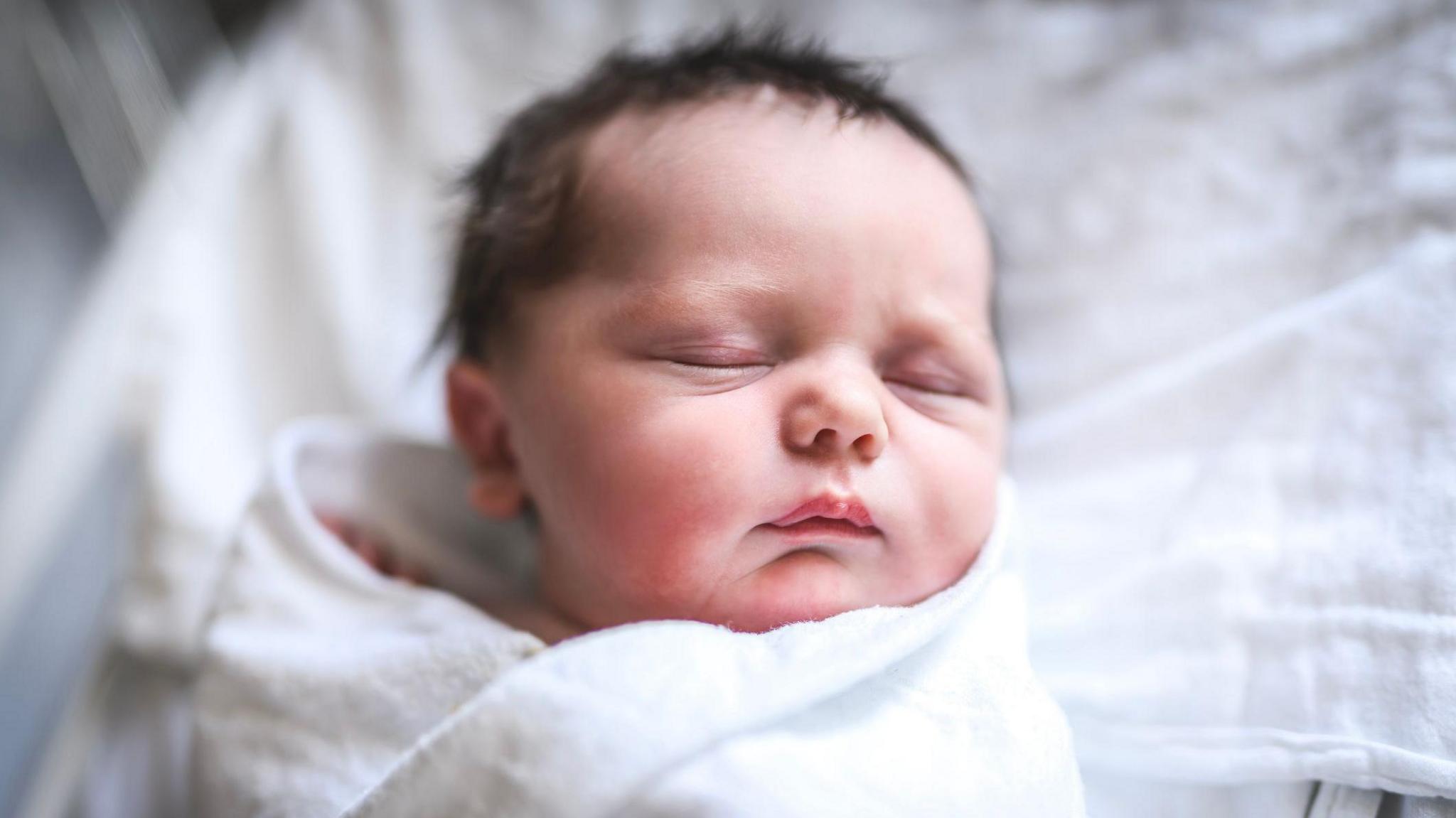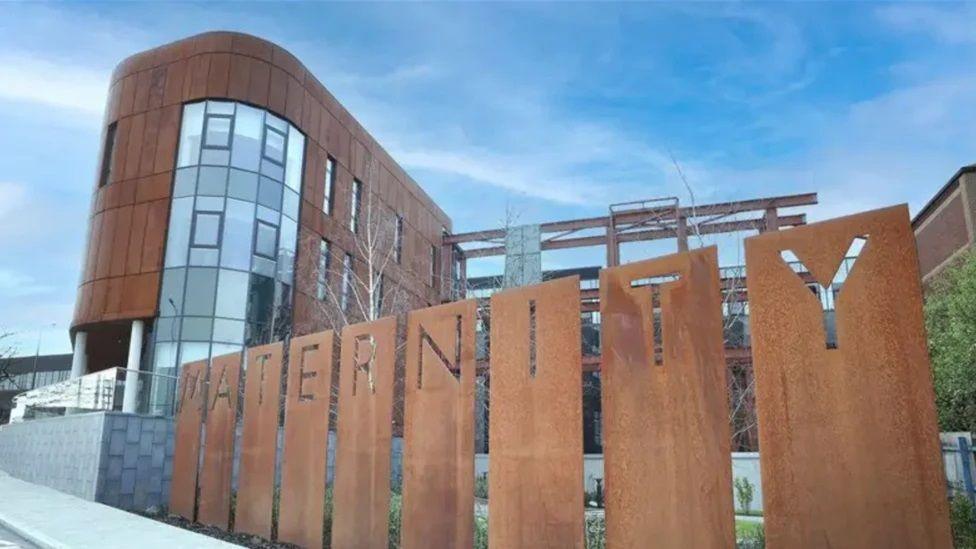Belfast Health Trust questioned over hospital delays

- Published
A member of Stormont's health committee has asked if the Belfast Health Trust should be placed on "special measures" considering the delays and costs surrounding Belfast's new maternity hospital.
Senior trust executives and Department of Health officials were summoned to the committee following further revelations about the facility, which is almost a decade behind schedule.
DUP MLA Diane Dodds told The View she "did not think anyone on the health committee today was satisfied with what they heard" at the committee.
It emerged that in the worst-case scenario of fixing the problems there could be a further delay of up to four years with an additional cost of up to £9m.
A potentially dangerous bacteria was first discovered in the water systems at the hospital in 2022 and means there is no date yet for its opening.

Could be millions
Experts are currently carrying a review into how significant the problem is at the site at the Royal Victoria Hospital.
About £50,000 is to be spent repairing the latest issue with medical gas pipework, however on Thursday the committee heard that the worst-case scenario of water pipe repairs could run into many millions.
A hospital trust or facility is placed in special measures when its rated as being "inadequate"; when questions are raised over leadership or when it is unable to make sufficient improvements in a reasonable timeframe.
Typically to handle all this someone from outside the trust is appointed to oversee what is happening.
'I am confused'
In what was billed as a fact-finding exercise into what has gone wrong at the maternity hospital, the committee's temporary chair Linda Dillon said she was "absolutely confused" following a briefing by the trust's interim chief executive Maureen Edwards.
"It is very comprehensive what you have given us, but I am confused still about where the responsibility lay," Dillon said.
"Learning is one thing, but if there is accountability then that also needs to play its part.
"If there are people who didn't do the right thing or who made a mistake or knew that something different should have been done, then we need to know and understand that, because it was public money."
Ms Edwards said that the full report into the issue of the pseudomonas bacteria at the hospital would determine three potential courses of action.
The worst case was that the entire water pipework would be replaced at a cost of £7-9m and could take three to four years, she told assembly members.
"I recognise, and I indeed share, the health committee's frustration and the public's frustration with the delays and the cost increases associated with the maternity hospital scheme," she said.
"Our focus at this juncture is obviously to safely open a 21st century hospital that the mothers and babies of Northern Ireland deserve, but we know that needs to be safe."

Colin McGrath asked who was holding the trust to account
The SDLP's Colin McGrath asked questions about how the trust was spending public money and who was holding it to account.
Addressing the Department of Health officials, he said: "You are the guys who are supposed to be keeping an eye on these guys (the health trust) and the work they are doing.
"If it were anywhere else, I would suspect, politely, these guys would be in special measures, they maybe as a trust can't be trusted with public money in terms of delivering services, because they are going way over budget."
In September, the BBC revealed that pseudomonas was again discovered at the maternity hospital just weeks after it was officially accepted by the trust from the contractor.
The trust took possession of the five-story building in March this year, but high levels of the bug were discovered in water pipes a month later after a four-week operating exercise and sample testing.
Trust officials said that while the former chief executive (Dr Cathy Jack) had signed for the building, on a project that size it is not the sole responsibility of just one person but instead several groups and the former chief executive had signed on everyone's behalf.
The board's chair, Ciaran Mulgrew, said it had been across all the problems since before 2023 and he said "no-one is shirking responsibility".
'Sort this out'

Diane Dodds was speaking on The View
Speaking on BBC NI's The View on Thursday night, committee member, DUP MLA Diane Dodds said: "I don't think anyone on the health committee today was satisfied with what they heard.
"I don't think anyone was satisfied in relation to the answers around the pipework.
"I don't think anyone was satisfied in relation to issues around accountability and how on earth the trust had managed to get themselves in this position."
She added: "I think they [the trust] have got to get on ahead and sort this out."
Allow X content?
This article contains content provided by X. We ask for your permission before anything is loaded, as they may be using cookies and other technologies. You may want to read X’s cookie policy, external and privacy policy, external before accepting. To view this content choose ‘accept and continue’.
Red flag rated issues
Earlier this year, the Northern Ireland Audit Office said the latest estimated date for completion of the final phase of the maternity hospital is June 2025.
"The original cost estimate was £57m, with costs now expected to be £97m," it said in a report.
The committee also heard about other issues, including fire alarms and nurse call buttons, which have been addressed and were no longer being treated as red flag rated issues which could delay opening.
The BBC understands almost £200,000 was spent on the fire alarm problems, which was not fully tested before the handover.
Nurse call alarms which had also been faulty are now working.
The department officials and trust executives said they were not aware of any other major problems with the maternity hospital but said no project could ever be guaranteed to be problem-free.
Clarification 10 December 2023: This article was updated following clarification from the Belfast Trust that Ms Edwards had accepted the handover of the maternity hospital and not Cathy Jack.